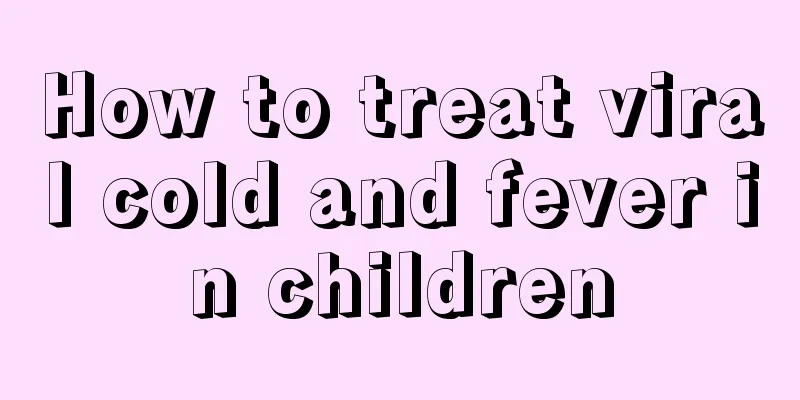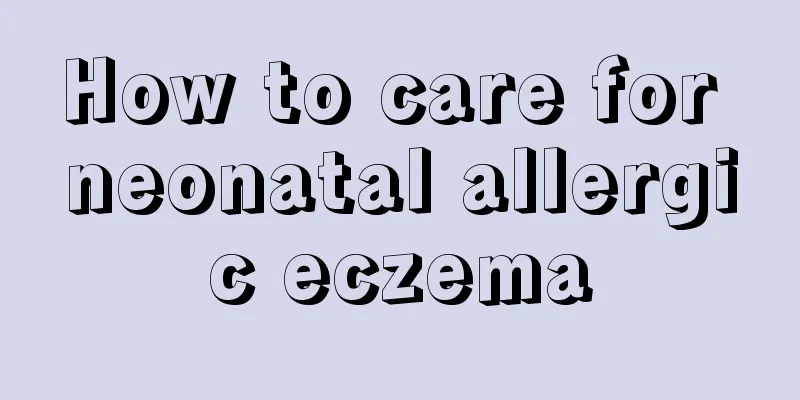What causes roseola in infantile eczema?

|
Once you contract roseola infantum, the disease progresses very rapidly. It is a contagious disease caused by a viral infection. Once the disease occurs, the most obvious symptom is usually fever. Some parents do not particularly understand the disease of roseola infantum, and often when the disease occurs, they are in a panic and do not know what to do. In fact, if the child with roseola infantum has a high fever that does not subside, go to the hospital for treatment in time. What causes infantile rash? Human herpesvirus-6 infection The etiology of the disease in young children is human herpes virus type 6 infection. The reason why babies can gain lifelong immunity after suffering from roseola is that the human body will develop corresponding immunity after being infected with the virus. The source of transmission of this virus is not only babies who are already sick, but also parents and relatives who are immune carriers of the virus. The virus can be transmitted through droplets. Roseola infantum often occurs in babies aged 6-18 months. After the age of 3, few babies are sick. It is more common in spring and autumn. There is no difference between male and female in this disease. The baby's low disease resistance is also one of the causes of roseola. Can children take antipyretics in emergency room? Roseola infantum is a common viral rash disease in infancy and childhood, mainly seen in infants under 2 years old, especially infants under one year old. The clinical characteristics of this disease are sudden onset of high fever. The body temperature can rise to 40°C or higher within a few hours. After 3 to 4 days of continuous high fever, the body temperature drops suddenly. At the same time as the body temperature drops or shortly afterwards, light red maculopapular rash quickly appears on the skin. The rash is mostly scattered and can be seen all over the body, but is less common on the face and distal limbs. The rash disappears quickly within 1 to 2 days after it appears, leaving no pigmentation or desquamation. Although the fever is high during roseola infantum, the child is in good spirits and has mild systemic symptoms, including only mild redness of the throat, sometimes accompanied by a mild cough, and no other obvious signs. However, convulsions may occur in the event of a sudden high fever, so you should be careful. In case of high fever, antipyretics can be used appropriately and drink plenty of water. Generally no special treatment is required, and antibiotics are not necessary for those without complications. The baby first has a high fever that lasts for 3 to 4 days, with the body temperature between 39 and 40 degrees Celsius. After the fever subsides, a rash quickly appears all over the body and disappears quickly, without desquamation or pigmentation. Mild diarrhea may occur immediately afterwards, which will heal on its own. There are symptoms similar to those of a cold, but they are not obvious. The spirit, appetite, etc. are still good. The throat may be a little red. The lymph nodes in the neck and occipital region can be felt, but there is no tenderness. Roseola infantum has no effect on the baby's health and will not occur again once it occurs. |
<<: What should I do if I have received intravenous drip for roseola infantum?
>>: Is it normal to cough after roseola infantum?
Recommend
Can children with mild cerebral palsy heal on their own?
There is a certain chance that newborn babies wil...
Why does the child's temple hurt?
The temple acupuncture point is very important to...
What should I do if my child has purpura?
Purpura is a disease with a relatively high incid...
Is a baby's soft body an early sign of cerebral palsy?
After three months, the baby's body can be st...
What should students eat when they stay up late?
Students nowadays are working particularly hard, ...
How to effectively treat children's athlete's foot
Not only adults can suffer from athlete's foo...
Why is my baby's forehead cold?
Parents attach great importance to their baby'...
The main symptoms of zinc deficiency in babies
We all know that children are in the stage of phy...
What medicine is used for children's sinusitis?
When children suffer from sinusitis, it is clinic...
A 17-year-old girl had back pain and was found to have 4 kidneys
Xiaolin (pseudonym) is a 17-year-old high school ...
6 signs of high IQ in babies
At birth, smart newborns may be more alert than o...
What are the causes of recurrent tonsillitis in children?
What families worry about most is that their chil...
What are the symptoms of children's allergic reaction to cephalosporin?
Cephalexin is a very common anti-inflammatory ant...
Causes of white spots on children's arms
Pay attention when white spots appear on children...
How to stimulate the appetite of a 2-year-old baby?
Many mothers may have this experience: their youn...









